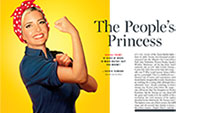 |
1. “Can a hectoring president bring jobs back to the industrial Midwest?” Lisa Miller asked in New York’s most recent issue (“Ford Country, Trump’s America,” May 15–28). Her answer wasn’t a simple yes or no, and neither was Didier Pietri’s, the director of Live Another Day: The True, Inside Story of the Auto Bailout. He wrote, “Once manufacturing jobs leave the country, it is hard to get them to come back. Yet politicians on both sides of the aisle have created an environment with NAFTA where U.S. auto manufacturers and others are incentivized to ship these jobs across the southern border. Can President Trump reverse or at least slow down the process? Yes, to a certain extent it is possible, but it will not be easy. It will take political will, local incentives, discussions with the UAW, and the ability to revise aspects of our trade agreements. But it is worth a shot because simply saying ‘that’s the way the world works now, sorry about your jobs’ may make sense on Wall Street or in the bubble in which many economists live, but it does not on the streets of Flint, Dearborn, or Fort Wayne.” Commenter Jamie01 wrote, “Southeastern Michigan is Ford country, but so are areas in Mexico, Brazil, Germany, etc. It’s a global company, publicly traded with shareholders all over the world. In fact, the Focus and Fiesta were conceived, designed, and engineered by Ford Europe. My Focus, made at the Michigan assembly plant, is no more or less an import than the Indiana-made Subaru I previously owned.” And commenter Paw argued that the debate would soon be moot: “As soon as they are able, all the automakers will replace human workers with robots for all manufacturing jobs.” The story would continue to develop, with Ford announcing that it would cut roughly 10 percent of its salaried workforce in North America and Asia. A week later, the company revealed that chief executive Mark Fields would be replaced by Jim Hackett, who previously helmed the company’s autonomous-driving efforts.
 |
2. Caitlin Flanagan’s close read of Ivanka Trump and her role in Washington (“The People’s Princess,” May 15–28) provoked strong reactions — and a lot of ire — for the (ironically intended) illustration of her as Rosie the Riveter. “Why would you ruin that iconic picture with this grifter’s mug?” @LKNWoman tweeted. Mycomment added, “It’s obscene to repurpose one of the most iconic images of American working women — answering the call to duty for their nation — as Ivanka Trump … who is answering the call to market that wretched family’s brand.” But Michael Dobson, director of the Shakespeare Institute, was more interested in the parallels Flanagan drew between Ivanka’s new life and the plot of King Lear. Dobson wrote, “I think the notion of Ivanka as a Cordelia (with dashes of Goneril and Regan thrown in) works quite well, but I fear that all attempts to liken her father to Shakespearean protagonists, generally noted for their eloquence and complexity, are doomed to failure. If the Donald does resemble one of the great tyrannous fathers of world drama, it isn’t King Lear (Lear, admittedly, ever but slenderly knew himself): It is Alfred Jarry’s Père Ubu. If there is one thing the first few months of the Trump presidency have achieved, it is to make Ubu Roi look like a specimen of documentary realism.” Historical and literary antecedents aside, readers seemed to enjoy the author’s acerbic analysis. “Getting Caitlin Flanagan to write about Ivanka was a stroke of crazy genius,” @namarasmith tweeted. And Pamela Paul, editor of The New York Times Book Review, added, “Sheer brilliance … Read it even if [you’re] sick of reading about Ivanka.”
3. Lizzy Goodman’s oral history of the Strokes in the early aughts gave the band members a chance to tell their story in their own words (“The Last Moment of the Last Great Rock Band,” May 15–28). But most readers glommed on to Ryan Adams’s ignominious relationship with the band. SB Nation’s Spencer Hall weighed in: “The oral history of the Strokes confirms that Ryan Adams needs to have his ass kicked daily.” Sean Gentille at the Pittsburgh Post-Gazette added, “I already want this to be made into a movie where the main villain is Ryan Adams.” But @chellanegro tweeted, “Blaming Ryan Adams for breaking up the Strokes is like blaming Obama for the rise in gas prices. Shit’s inevitable, man.” �When one Twitter user highlighted journalist Gideon Yago’s “burn” on Adams, the singer-songwriter waded into the fray, writing, “The only thing Gideon Yago is burning these days are lattes when it’s rush hour at Coffee Bean.”